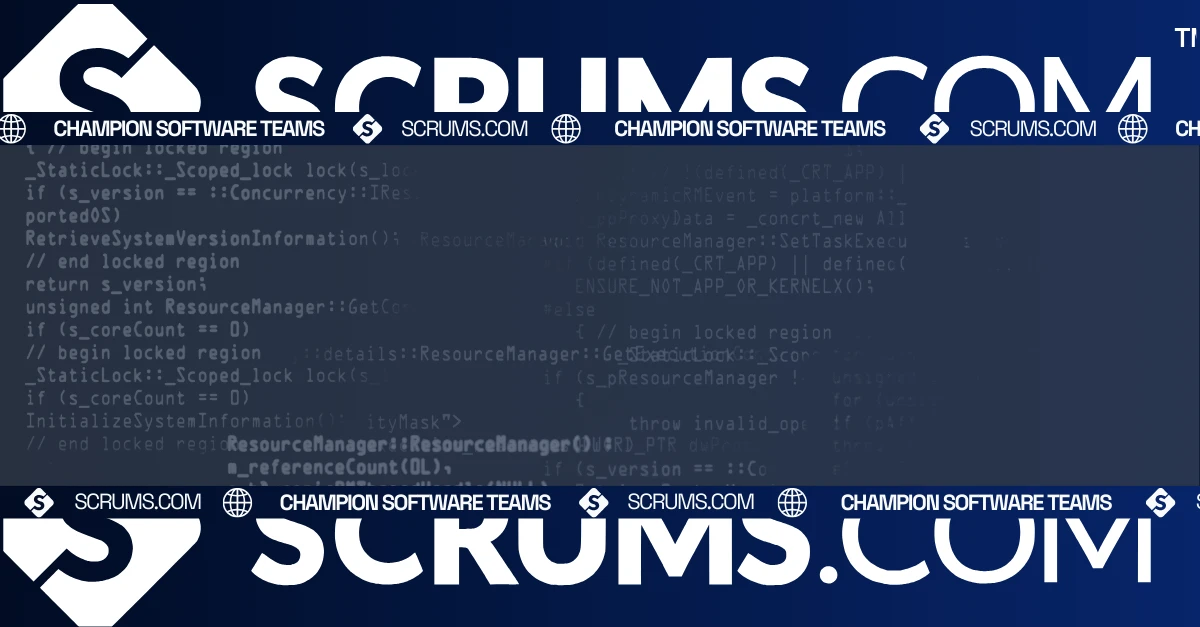Custom software development company in Finland
Build AI-powered custom software solutions with Scrums.com's Software Engineering Orchestration Platform (SEOP). With a remarkable Net Promoter Score (NPS) of 82, Scrums.com crafts cost-effective, scalable software that drives results.
Software Development in Finland
Finland has established itself as a global leader in technology and innovation, boasting a thriving software development industry that contributes significantly to the country's economy. Known for its highly educated workforce and advanced technological infrastructure, Finland has become a hotspot for software development, attracting talent and investment from around the world. The country's tech scene is bolstered by a strong focus on research and development, supported by government initiatives and a culture of innovation.
Helsinki, the capital, is a vibrant tech hub, hosting numerous startups, tech giants, and incubators that drive the software development landscape forward. According to Statistics Finland, the ICT sector, including software development, accounted for 6% of Finland’s GDP in 2023, showcasing the sector's importance to the nation's economy. The demand for software developers continues to rise, with skills in AI, cloud computing, and cybersecurity particularly sought after.
Why Finland Needs Custom Software Development
Finland's unique market dynamics and rapidly evolving industries necessitate custom software development to meet specific business needs. As the country transitions towards a digital-first economy, industries such as healthcare, education, gaming, and manufacturing are increasingly reliant on tailored software solutions to drive innovation, enhance efficiency, and improve customer experiences. The healthcare sector, for instance, benefits from custom software in areas like telemedicine, patient management, and predictive analytics, which streamline operations and improve patient outcomes.
Finland's renowned gaming industry, led by companies like Supercell and Rovio, thrives on bespoke development to create engaging, high-performance games that captivate global audiences. Furthermore, custom software is vital in Finland's manufacturing sector, where automation, IoT, and smart factories are redefining production processes. Studies indicate that businesses leveraging custom software solutions see a 30% increase in operational efficiency, highlighting the critical role of personalized technology in Finland's economic landscape.
How Technology is Affecting Finland
Technology is deeply integrated into Finland’s societal and economic fabric, influencing nearly every aspect of daily life and business. In urban centers like Helsinki and Espoo, technology is used to enhance public services, from smart city initiatives that improve transportation and energy management to digital platforms that facilitate seamless interactions between citizens and government agencies. In education, Finland’s embrace of technology has transformed traditional learning methods, with e-learning platforms and digital tools now standard in classrooms, enhancing the country’s already world-class education system. However, the rapid adoption of technology also presents challenges, such as ensuring data privacy and cybersecurity, which have become critical as Finland expands its digital footprint. Recent reports indicate that Finland is among the leading countries in Europe in digital transformation readiness, positioning it well to tackle both the opportunities and challenges that technology brings.
Technology Trends Shaping Finland
Several key technology trends are currently shaping Finland's future, with custom software development playing a pivotal role. One major trend is the rise of artificial intelligence and machine learning, which are being utilized across various sectors, from predictive maintenance in manufacturing to personalized marketing in retail. Finland’s commitment to AI development is evident through initiatives like the Finnish Center for Artificial Intelligence (FCAI), which collaborates with businesses to integrate AI into their operations.
Another prominent trend is the growth of the Internet of Things (IoT), particularly in smart city projects and industrial applications, enhancing everything from traffic management to energy efficiency. Additionally, the emphasis on sustainable technology solutions reflects Finland’s commitment to combating climate change, with green tech innovations becoming a crucial part of the country's tech ecosystem. The widespread adoption of cloud computing and edge computing is further enhancing data processing capabilities, making software development faster, more secure, and highly scalable.
What are the Tech Stacks?
Finland’s software development landscape is characterized by the use of modern and diverse tech stacks that cater to various needs and industries. JavaScript frameworks, such as React, Angular, and Vue.js, are widely popular for front-end development due to their flexibility and robust performance. For back-end development, Node.js, Django (Python), and Spring Boot (Java) are commonly used, providing scalable solutions for complex applications.
Cloud computing platforms like AWS, Azure, and Google Cloud dominate the market, enabling businesses to deploy scalable, secure, and high-performance applications. For mobile development, React Native and Flutter are the go-to frameworks, favored for their cross-platform capabilities and rapid development cycles. Additionally, DevOps tools like Jenkins, Docker, and Kubernetes are integral in streamlining software deployment and managing containerized applications. Finland’s strong focus on cybersecurity is reflected in the widespread use of secure coding practices and tools like OWASP ZAP for security testing.
The Advantages of the Tech Stacks
The tech stacks prevalent in Finland offer numerous advantages, enhancing the country’s position as a technology leader. JavaScript frameworks like React and Vue.js enable rapid, responsive, and dynamic web development, crucial for businesses looking to deliver seamless user experiences. Back-end solutions like Django and Node.js provide the scalability needed to handle the complex needs of Finland’s high-tech industries, from gaming to IoT.
Cloud platforms such as AWS and Azure ensure that applications are not only scalable but also secure and compliant with international standards, an essential feature for Finnish companies operating globally. React Native and Flutter streamline mobile app development, allowing developers to create high-performance applications for both Android and iOS with a single codebase, reducing costs and time to market. The integration of DevOps practices further enhances development efficiency, enabling continuous integration and delivery, which are essential for maintaining the agility of Finnish tech companies.
Industries Benefiting from Custom Software Development in Finland
Several key industries in Finland are leveraging custom software development to stay competitive and innovative. The gaming industry, a cornerstone of Finland’s tech scene, relies heavily on bespoke development to create unique, engaging user experiences. The healthcare sector benefits from custom software solutions that enhance patient care, from advanced diagnostic tools to telemedicine platforms that connect patients with healthcare providers remotely.
In manufacturing, Finland’s push towards Industry 4.0 is supported by custom software that facilitates automation, predictive maintenance, and real-time data analytics, driving efficiency and reducing costs. The education sector, too, is undergoing a digital transformation, with custom e-learning platforms providing personalized learning experiences that cater to individual student needs. Even Finland’s public sector is embracing custom software, with smart city initiatives using tailored solutions to optimize urban planning, resource management, and public services.
Service Offerings by Scrums.com
Scrums.com offers a comprehensive range of software development services tailored to meet the diverse needs of businesses in Finland:
- Custom Software Development: We build bespoke software solutions tailored to your specific business needs, ensuring a perfect fit for your operations and objectives.
- Mobile App Development: Our team specializes in creating high-performance mobile applications for both Android and iOS platforms, leveraging the latest technologies to deliver exceptional user experiences.
- Web Development: We design and develop robust, scalable web applications using modern tech stacks like MERN, MEAN, and LAMP, ensuring seamless performance and functionality.
- Cloud Solutions: Our cloud development services include building scalable, secure, and efficient cloud-based applications that enhance accessibility and collaboration.
- AI and Machine Learning: We integrate AI and ML capabilities into your software to provide intelligent, adaptive solutions that drive innovation and improve efficiency.
- Software Developer Analytics: We leverage data analytics to provide insights into software performance, user behavior, and development processes, enabling data-driven decision-making and continuous improvement.
- Staff Augmentation Services: Our staff augmentation services provide you with experienced software developers who seamlessly integrate with your team, helping to meet project deadlines and enhance your development capabilities.
- Software Maintenance and Support: We offer ongoing maintenance and support to ensure your software remains secure, up-to-date, and performs optimally.
Partner with Scrums.com for Your Software Development Needs
Scrums.com is a leading custom software development company that combines global expertise with innovative solutions to deliver powerful software that meets your unique business needs. Whether you are looking to develop a web application, a mobile app, or an enterprise solution, our team of skilled developers and engineers is here to help you every step of the way. Contact us today to discuss how we can help you achieve your goals with our comprehensive software development services.
Don't Just Take Our Word for It
Hear from some of our amazing customers who are building with Scrums.com Teams.
Find Related Software Development Company Locations
Software Development Sweden
Software Development Stockholm
Software Development Copenhagen
Software Development Denmark
Software Development Oslo
Software Development Germany
Software Development Berlin
How to Hire Scrums.com for Custom Software Development
Align
Let us get to know your business. Book a free consultation and tell us about your requirements and software development project details.
About Us
We will discuss Scrums.com, our processes and how our our hiring process and subscriptions work.
Next Steps
We will discuss Scrums.com's custom development solutions and how we can best solve your current business problem.
Kick-Off
Once we have agreed on the best way forward, we will start the contract closure process. Once that's done - We can kick-off!
Explore Software Development Blogs
The most recent trends and insights to expand your software development knowledge.















